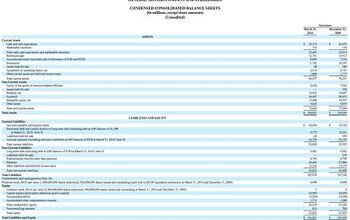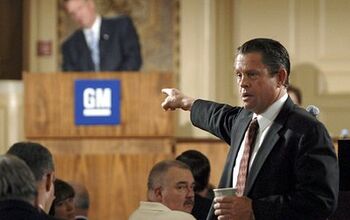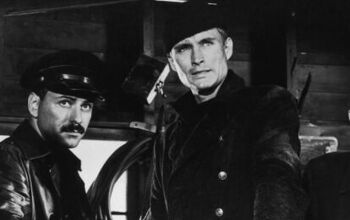General Motors Death Watch 38: General by Name
While GM models continue to debut and disappear like Manolo Blahniks, the Chevrolet Corvette stays the course, slowly evolving towards excellence. To mark the retirement of Chief Engineer Dave Hill, Car Czar Bob Lutz posted a short honorific on GM's fastlane blog: "Dave was often disruptive, stubborn, unwilling to take direction, unwilling to take advice, unwilling to accept constraints or limits — in other words, the perfect man for the job." In other other words, Hill was a successful guardian of the Corvette flame DESPITE GM, not because of it.
Lutz' unintentional condemnation of his employer's corporate culture won't surprise anyone who's had dealings with The General. I've received dozens of emails from GM workers and suppliers. They describe an organization so complex it makes the legal system in Kafka's The Trial seem like basic addition. One story convinced me that the phrase "institutional paralysis" was coined by a seat bracket designer. Another persuaded me that "matrix management" and "total chaos" are synonymous. And another reminded me of A Confederacy of Dunces, and left me wondering why more GM managers haven't followed author John Kennedy Toole's example.
In all the discussion about GM's perilous financials, it's often forgotten that the company itself is a disaster. Think of it this way: no one at GM wakes up in the morning and says, right, let's go make some vehicles that are two product cycles behind the competition at a price that will bankrupt The General within the next year. [Mr. Hill would have probably sacrificed his left testicle to equip the 'Vette with Audi-esque soft touch plastics.] But something happens between morning muesli and Miller time that kills GM workers' creativity and stifles the company's competitiveness. That something is bureaucracy.
It's not about size. It's about focus. Toyota is living, breathing, money-making proof that a multinational automaker can produce millions of vehicles without tripping all over itself. To do so, to create an organizational structure lean enough to consistently produce genre-dominating cars, a carmaker must maintain laser-like focus. It must first decide EXACTLY what it wants to do, and then it must do it better than anyone else. As a corollary, the manufacturer must accept that it can't– shouldn't– do everything. It's about choosing your battles wisely, fighting them tenaciously and then protecting your territory with steadfast ferocity.
Domestically, GM has eight brands: Hummer, Buick, Pontiac, Cadillac, Saturn, Chevrolet, Saab and GMC. Which one of them has focus? Which one of them sells a coherent lineup, where every single model does [the same] one thing better than anyone else? Are all Chevy's economy cars? Do all Buicks lead their competition in interior quietness? Are all Pontiacs sexy? What do all Saabs, Saturns or GMC trucks do that no other vehicle in their class can match? Sure, all of GM's domestic brands sell cars that don't fall apart, get reasonable mileage, are reasonably comfortable and don't cost a fortune compared to the competition. But what's their unique selling point? Why bother buying one?
It's General Motors by name, general motors by nature. Once you go down that road, it's no wonder that the Chinese walls separating the brands disappear, and dozens of models across the eight brands emerge on their respective forecourts courtesy of the bloodless process known as badge engineering. Since all the cars within each of GM's eight brands must do everything pretty well, but none are asked to excel in any one area (save Hummer, but give it time), it makes perfect sense to save money by sharing management, designers, workers, models, parts, marketing, etc. Is it any wonder that GM's company culture rewards measured uniformity rather than breakthrough creativity?
Of course, inside any large organization, there will always be employees striving to realize their personal vision of product excellence– despite the internal forces ranging against them. Dave Hill was one of GM's "mavericks'; I'm sure he could tell plenty of stories of missed opportunities, needless compromise and administrative lethargy. In any case, Hill's success is an anomoly: the exception that proves the rule. Just think of all the nameless managers who were prevented from creating something great because they had to satisfy GM's overarching desire to do something good…
We've said it before. We'll say it again: GM must die. You can't fix this company. Even if GM's unions agreed to join their Chinese colleagues and work for $1.50 per hour, even if several of GM's 14 (count 'em 14) crossovers are a runaway success, the company is deeply, fundamentally, culturally flawed. Shuttering Buick, Saturn and Saab would help, but nothing can save a car company that's a jack of all trades and master of none.
More by Robert Farago
Latest Car Reviews
Read moreLatest Product Reviews
Read moreRecent Comments
- SPPPP Vibrant color 9 times out of 10 for me. There may be a few shapes that look just right in metallic gray, for example. There are a few nices ones out there. And I like VW "White Silver". But I'd usually prefer a deep red or a vibrant metallic green. Or a bright blue.
- 28-Cars-Later Say it ain't so, so reboot #6* isn't going to change anything?[list=1][*]V4-6-8 and High "Tech" 4100.[/*][*]Front wheel drive sooooo modern.[/*][*]NOrthSTARt.[/*][*]Catera wooooo.[/*][*]ATS all the things.[/*][*]We're *are* your daddy's Tesla. [/*][/list=1]
- MaintenanceCosts Can I have the hybrid powertrains and packaging of the RAV4 Hybrid or Prime with the interior materials, design, and build quality of the Mazda?
- ToolGuy I have 2 podcasts to listen to before commenting, stop rushing my homework.
- ToolGuy Please allow me to listen to the podcast before commenting. (This is the way my mind works, please forgive me.)


































Comments
Join the conversation